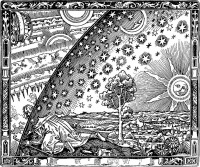World
From The Art and Popular Culture Encyclopedia

|
"All the world's a stage, "This world ¨...] is very faulty and imperfect [...] and was only the first rude essay of some infant deity, who afterwards abandoned it, ashamed of his lame performance: it is the work only of some dependent, inferior deity; and is the object of derision to his superiors: it is the production of old age and dotage in some superannuated deity; and ever since his death, has run on at adventures, from the first impulse and active force which it received from him." --Dialogues Concerning Natural Religion (1779) by David Hume |
|
Related e |
|
Featured: |
The World is the Earth and all life on it, including human civilization. In a philosophical context, the "world" is the whole of the physical Universe, or an ontological world (the "world" of an individual). In a theological context, the world is the material or the profane sphere, as opposed to the celestial, spiritual, transcendent or sacred spheres. "End of the world" scenarios refer to the end of human history, often in religious contexts.
The history of the World is commonly understood as the history of humanity spanning the major geopolitical developments of about five millennia, from the first civilizations to the present. In terms such as world religion, world language, world government, and world war, the term world suggests an international or intercontinental scope without necessarily implying participation of every part of the world.
The world population is the sum of all human populations at any time; similarly, the world economy is the sum of the economies of all societies or countries, especially in the context of globalization. Terms such as "world championship", "gross world product", and "world flags" imply the sum or combination of all sovereign states.
Contents |
In philosophy
In philosophy, the term world has several possible meanings. In some contexts, it refers to everything that makes up reality or the physical universe. In others, it can mean have a specific ontological sense (see world disclosure). While clarifying the concept of world has arguably always been among the basic tasks of Western philosophy, this theme appears to have been raised explicitly only at the start of the twentieth century and has been the subject of continuous debate. The question of what the world is has by no means been settled.
Usage
'World' distinguishes the entire planet or population from any particular country or region: world affairs are those which pertain not just to one place but to the whole world, and world history is a field of history which examines events from a global (rather than a national or a regional) perspective. Earth, on the other hand, refers to the planet as a physical entity, and distinguishes it from other planets and physical objects.
'World' can also be used attributively, as an adjective, to mean 'global', 'relating to the whole world', forming usages such as World community. See World (adjective).
By extension, a 'world' may refer to any planet or heavenly body, especially when it is thought of as inhabited.
'World', when qualified, can also refer to a particular domain of human experience.
- The world of work describes paid work and the pursuit of a career, in all its social aspects, to distinguish it from home life and academic study.
- The fashion world describes the environment of the designers, fashion houses and consumers that make up the fashion industry.
- The New World is a part of the world discovered or colonized by Europeans later than other parts; it usually refers to the American continents or to Australia. Native Americans and Native Australians tend to dislike this usage. For them America and Australia are not new. Their ancestors have lived there since time immemorial. The Old World refers, by contrast, to the continents of Europe, Asia and north Africa.
Namesakes
- Rabelais and His World by Mikhail Bakhtin
- The World as Will and Representation by Arthur Schopenhauer
See also
- Asia, Africa, North America, South America, Antarctica, Europe, and Australia
- All the world's a stage
- External world
- Imperialism
- International
- World's Fair
- World Heritage Site
- World Press Photo
- World War I
- World War II
- World War II resistance movement
- World cinema
- World culture
- World domination
- World literature
- World music
- World population
- Worldview
- Theatrum mundi
- Harmonia mundi
- Contemptus mundi
In theology

|
"And we created you as a being neither celestial nor earthly, neither mortal nor immortal alone, so that you as a free and sovereign artist can mold and model yourself in the form that you prefer; you can degenerate to animal, but you can also rise to the higher, divine kingdom ... You alone have the power to develop and grow according to free will." --Pico della Mirandola, Oration on the Dignity of Man, tr. Jan-Willem Geerinck |
World is a key concept in theology.
In some religions, worldliness (also called carnality is that which relates to this world as opposed to other worlds or realms.
It is synonymous to earthly (relating to the earth) and shares its connotation with this world, as opposed to heaven.
Christian views on the World
In Christianity, the concept connotes the fallen and corrupt world order of human society. The world is frequently cited alongside the flesh and the Devil as a source of temptation that Christians should flee. Monks speak of striving to be "in this world, but not of this world", and the term "worldhood" has been distinguished from "monkhood", the former being the status of merchants, princes, and others who deal with "worldly" things.
This view is clearly expressed by king Alfred the Great of England (d. 899) in his famous Preface to the Cura Pastoralis:
- "Therefore I command you to do as I believe you are willing to do, that you free yourself from worldly affairs (Old English: woruldðinga) as often as you can, so that wherever you can establish that wisdom that God gave you, you establish it. Consider what punishments befell us in this world when we neither loved wisdom at all ourselves, nor transmitted it to other men; we had the name alone that we were Christians, and very few had the practices."
Although Hebrew and Greek words meaning "world" are used in Scripture with the normal variety of senses, many examples of its use in this particular sense can be found in the teachings of Jesus according to the Gospel of John, eg. 7:7, 8:23, 12:25, 14:17, 15:18-19, 17:6-25, 18:36. For contrast, a relatively newer concept is Catholic imagination.
The World, the Flesh and the Devil is a common figure of speech in the Church which reflects these sentiments.
Contemptus mundi is the name given to the recognition that the world, in all its vanity, is nothing more than a futile attempt to hide from God by stifling our desire for the good and the holy. This view has been criticized as a pastoral of fear by modern historian Jean Delumeau.
During the Second Vatican Council, there was a novel attempt to develop a positive theological view of the World, which is illustrated by the pastoral optimism of the constitutions Gaudium et Spes, Lumen Gentium, Unitatis Redintegratio and Dignitatis Humanae.
Eastern Christianity
In Eastern Christian monasticism or asceticism the world of mankind is driven by passions. Therefore the passions of the World are simply called "the world". Each of these passions are a link to the world of mankind or order of human society. Each of these passions must be overcome in order for a person to receive salvation (theosis). The process of theosis is a personal relationship with God. This understanding is taught within the works of ascetics like Evagrius Ponticus, and the most seminal ascetic works read most widely by Eastern Christians, the Philokalia and the Ladder of Divine Ascent (the works of Evagrius and John Climacus are also contained within the Philokalia). At the highest level of world transcendence is hesychasm which culminates into the Vision of God.
Orbis Catholicus
Orbis Catholicus is a latin phrase meaning Catholic World, per the expression Urbi et Orbi, and refers to that area of Christendom under papal supremacy. It is somewhat similar to the phrases Secular world, Jewish world and Islamic world.
See also
- Around the World in Eighty Days
- Anthony the Great
- John Climacus
- Gregory Palamas
- Philokalia
- Seraphim of Sarov
- Seraphim Rose
- Symeon the New Theologian
- Chthonic
- Worldly
- World to come
.jpg)


